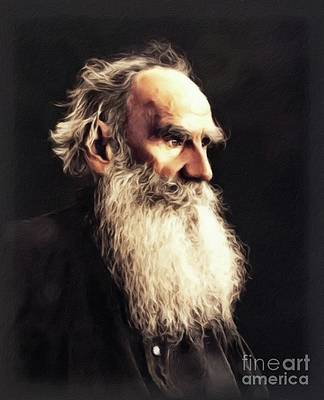Leo Tolstoy Archive
Written: 1899
Source: Original text from Gutenberg.org
Transcription/Markup: Andy Carloff
Online Source: RevoltLib.com; 2021

When they had passed the anteroom and the sickening, stinking corridor, the Englishman and Nekhludoff, accompanied by the inspector, entered the first cell, where those sentenced to hard labor were confined. The beds took up the middle of the cell and the prisoners were all in bed. There were about 70 of them. When the visitors entered all the prisoners jumped up and stood beside the beds, excepting two, a young man who was in a state of high fever, and an old man who did nothing but groan.
The Englishman asked if the young man had long been ill. The inspector said that he was taken ill in the morning, but that the old man had long been suffering with pains in the stomach, but could not be removed, as the infirmary had been overfilled for a long time. The Englishman shook his head disapprovingly, said he would like to say a few words to these people, asking Nekhludoff to interpret. It turned out that besides studying the places of exile and the prisons of Siberia, the Englishman had another object in view, that of preaching salvation through faith and by the redemption.
“Tell them,” he said, “that Christ died for them. If they believe in this they shall be saved.” While he spoke, all the prisoners stood silent with their arms at their sides. “This book, tell them,” he continued, “says all about it. Can any of them read?”
There were more than 20 who could.
The Englishman took several bound Testaments out of a hang-bag, and many strong hands with their hard, black nails stretched out from beneath the coarse shirt-sleeves towards him. He gave away two Testaments in this cell.
The same thing happened in the second cell. There was the same foul air, the same icon hanging between the windows, the same tub to the left of the door, and they were all lying side by side close to one another, and jumped up in the same manner and stood stretched full length with their arms by their sides, all but three, two of whom sat up and one remained lying, and did not even look at the newcomers; these three were also ill. The Englishman made the same speech and again gave away two books.
In the third room four were ill. When the Englishman asked why the sick were not put all together into one cell, the inspector said that they did not wish it themselves, that their diseases were not infectious, and that the medical assistant watched them and attended to them.
“He has not set foot here for a fortnight,” muttered a voice.
The inspector did not say anything and led the way to the next cell. Again the door was unlocked, and all got up and stood silent. Again the Englishman gave away Testaments. It was the same in the fifth and sixth cells, in those to the right and those to the left.
From those sentenced to hard labor they went on to the exiles.
From the exiles to those evicted by the Commune and those who followed of their own free will.
Everywhere men, cold, hungry, idle, infected, degraded, imprisoned, were shown off like wild beasts.
The Englishman, having given away the appointed number of Testaments, stopped giving any more, and made no speeches. The oppressing sight, and especially the stifling atmosphere, quelled even his energy, and he went from cell to cell, saying nothing but “All right” to the inspector’s remarks about what prisoners there were in each cell.
Nekhludoff followed as in a dream, unable either to refuse to go on or to go away, and with the same feelings of weariness and hopelessness.